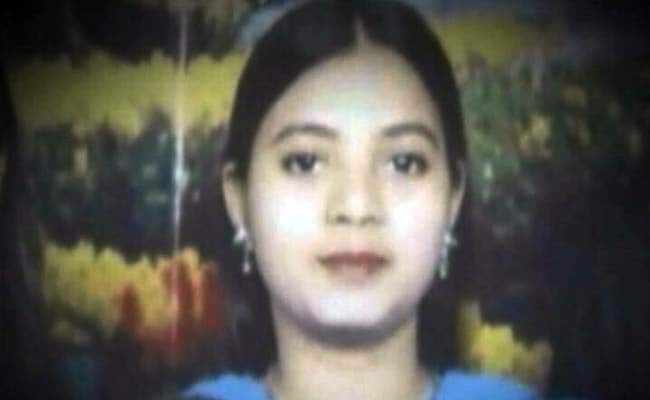
Ishrat Jehan and three others were killed in an encounter with Gujarat Police on the outskirts of Ahmedabad on June 15, 2004.
- Applicant asked details about the panel looking into missing Ishrat files
- Official heading panel was to retire on May 31, given 2-month extension
- Activists say Home Ministry is trying to delay the sought information
Did our AI summary help?
Let us know.
New Delhi:
In a rare instance, the Home Ministry has asked an RTI applicant to prove he is an Indian before disclosing details about the one-member panel looking into the missing files related to the alleged fake encounter case of Ishrat Jahan.
Senior IAS officer BK Prasad, Additional Secretary in the Home Ministry, heads the inquiry panel.
The RTI application was filed with the Ministry seeking copies of reports submitted by the panel besides file notings related to extension in service given to Mr Prasad.
"In this connection, it is requested that a proof of your Indian citizenship may please be provided," the Home Ministry said in its reply.
As per Right to Information Act, 2005, only Indian citizens can seek information.
Usually, a proof of citizenship is not required to file an application under the transparency law. In rare cases, a public information officer can seek proof of nationality in case he has doubt over citizenship of an applicant.
"It is a way to block free flow of information and transparency by the government. Seeking proof of Indian citizenship must be discouraged. The Home Ministry appears to delay the information sought from it," said RTI activist Ajay Dubey.
Mr Prasad, who heads the probe panel, is a 1983 batch IAS officer of Tamil Nadu cadre and was due to retire on May 31.
He has been given two months extension in service till July 31.
Following an uproar in Parliament in March this year, the Home Ministry had asked Mr Prasad to inquire into the whole matter of missing papers. The panel is yet to submit its report.
19-year-old Ishrat Jahan and three others were killed in an alleged fake encounter in Gujarat in 2004. The Gujarat Police had then said those killed were LeT terrorists and had come to Gujarat to assassinate the then chief minister Narendra Modi.
The probe panel has recently found a copy of a letter written by the then Home Secretary GK Pillai to the then Attorney General late GE Vahanvati from the hard disk of a computer of the Home Ministry, official sources said.
The papers, which disappeared from the Home Ministry, include the copy of an affidavit vetted by the then Attorney General and submitted in the Gujarat High Court in 2009 and the draft of the second affidavit vetted by the AG on which changes were made.
Two letters written by Mr Pillai to Vahanvati and the copy of the draft affidavit have also so far remained untraceable.
Senior IAS officer BK Prasad, Additional Secretary in the Home Ministry, heads the inquiry panel.
The RTI application was filed with the Ministry seeking copies of reports submitted by the panel besides file notings related to extension in service given to Mr Prasad.
"In this connection, it is requested that a proof of your Indian citizenship may please be provided," the Home Ministry said in its reply.
As per Right to Information Act, 2005, only Indian citizens can seek information.
Usually, a proof of citizenship is not required to file an application under the transparency law. In rare cases, a public information officer can seek proof of nationality in case he has doubt over citizenship of an applicant.
"It is a way to block free flow of information and transparency by the government. Seeking proof of Indian citizenship must be discouraged. The Home Ministry appears to delay the information sought from it," said RTI activist Ajay Dubey.
Mr Prasad, who heads the probe panel, is a 1983 batch IAS officer of Tamil Nadu cadre and was due to retire on May 31.
He has been given two months extension in service till July 31.
Following an uproar in Parliament in March this year, the Home Ministry had asked Mr Prasad to inquire into the whole matter of missing papers. The panel is yet to submit its report.
19-year-old Ishrat Jahan and three others were killed in an alleged fake encounter in Gujarat in 2004. The Gujarat Police had then said those killed were LeT terrorists and had come to Gujarat to assassinate the then chief minister Narendra Modi.
The probe panel has recently found a copy of a letter written by the then Home Secretary GK Pillai to the then Attorney General late GE Vahanvati from the hard disk of a computer of the Home Ministry, official sources said.
The papers, which disappeared from the Home Ministry, include the copy of an affidavit vetted by the then Attorney General and submitted in the Gujarat High Court in 2009 and the draft of the second affidavit vetted by the AG on which changes were made.
Two letters written by Mr Pillai to Vahanvati and the copy of the draft affidavit have also so far remained untraceable.
Track Latest News Live on NDTV.com and get news updates from India and around the world

